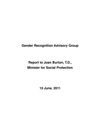Gender Recognition Advisory Group Report
Summary
The Gender Recognition Advisory Group (GRAG) was established by the Minister for Social Protection in May, 2010, following a High Court ruling that Ireland is in breach of the European Convention on Human Rights in not having a process to legally recognise the acquired gender of transsexual persons. Its terms of reference were to advise the Minister on the legislation required to provide for legal recognition of the changed gender of transsexuals.
Work of the Group
- Researched issues relating to transsexualism in Ireland and internationally - particularly the condition known as Gender Identity Disorder (GID).
- Consulted with medical and mental health experts and other stakeholders in Ireland, and with the authorities responsible for the operation of the Gender Recognition Act in the United Kingdom together with leading academics and the Registrar General for England and Wales.
- Issued a public consultation document in August, 2010. There was a good response from organisations (14) and individuals (26). The Group met with selected organisations and individuals in follow-up bilateral meetings.
- Conducted a review of legislation and schemes in other countries and international bodies as well as relevant European court cases.
- Analysed issues that take into account the input of experts, stakeholders, respondents to public consultation as well as domestic and international legal frameworks.
Outcome
- Recommendations on the legislation required to enable the Minister for Social Protection to set up a scheme whereby the State formally recognises the changed gender of transsexuals who have made a permanent transition to the preferred gender.
- Formal recognition to mean that the person's changed gender is fully recognised by the State for all purposes - including the right to marry in the changed gender and the right to a new birth certificate. Recognition of the changed gender to apply from the date of the recognition decision.
- All rights, responsibilities and consequences of actions by the person in their original assigned gender prior to the date of recognition remain unaffected.
Qualification Criteria
Based on analysis of the issues the Group recommends the following qualification criteria for applicants for gender recognition.
- Residency/Irish Birth Registration. Applications confined to persons whose births are registered in Ireland, persons included on the Foreign Births Register and persons who are ordinarily resident in Ireland.
- Minimum Age. Minimum age limit of 18 years.
- Marital and Civil Partnership Status. Persons in an existing valid marriage or civil partnership excluded from the scheme.
- Permanent Transition. A clear and settled intention to live in the changed gender for the remainder of his or her life.
- Living in the Role. A minimum 2-year period of living full-time in the changed gender.
- Medical Criteria. One of the following:
- a formal diagnosis of Gender Identity Disorder (GID) plus relevant supporting medical evidence, or
- medical evidence that the applicant has undergone gender reassignment surgery, or
- evidence of the recognition of changed gender in another jurisdiction.
Other Provisions
- Basic process for applying for gender recognition. Decision to be based on examination of documentary evidence submitted. Provision for oral hearings if required.
- Recognition decision to be made by a three-person independent Gender Recognition Panel appointed by Minister and supported by a secretariat.
- Panel to issue a Gender Recognition Certificate to successful applicants.
- Provisions relating to setting up of a Gender Recognition Register by the General Register Office (GRO), issue of new birth certificates and handling of data.
- Provision for appeal to the Family Court and for revocation/correction of issued certificates.




 Marriage Equality is a proud member of NELFA
Marriage Equality is a proud member of NELFA